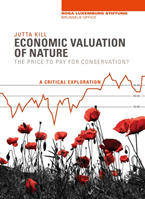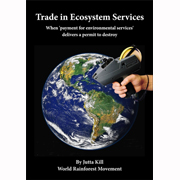Economic Valuation of Nature. The Price to Pay for Conservation? A critical exploration (Rosa Luxemburg Foundation)
Jutta Kill / Rosa Luxemburg Foundation / June 2014
 This report strongly critiques the valuing the environment as natural capital. The report first explains the arguments, logic and origins of concepts such as natural capital accounting and payments for ecosystems services. There is an explanation of the process of the financialization of nature.
This report strongly critiques the valuing the environment as natural capital. The report first explains the arguments, logic and origins of concepts such as natural capital accounting and payments for ecosystems services. There is an explanation of the process of the financialization of nature.
Read report
It then goes on to identify the key players pushing the economic valuation of nature including: multilateral institutions such as the World Bank, multinational corporations such as Rio Tinto, financial sectors actors who signed the Natural Capital Declaration, conservation NGOs including The Nature Conservancy, specialist investment funds and market makers such as Ecosystems Marketplace, and finally universities and consultancies.
This is followed by case studies where projects for carbon offsetting and biodiversity offsetting have failed.
A range of myths are explored and debunked including:
- The only way to save nature is to show its economic value
- Calculating the economic value is not the same as putting a price tag on nature
- Let’s face it – the forest was going to be destroyed anyway.
- Making companies pay for the destruction they cause is better than nothing
- Offsets should only be used as a last resort
- Some valuation is needed for determining accurate compensation for damage after, say, an oil spill
The report concludes the time has come to strongly reject the commodification of nature:
Saying ‘No’ to economic valuation of the web of life and the diversity it contains is also an important affirmation. It says “Yes” to acknowledging the interconnections between the human and the non-human that shape a specific location and that make nature in one place distinct and individual from nature in another location. It also affirms that the web of life must be treasured and respected, and that its continuing destruction must be resisted.
This resistance demonstrates that there is – and always has been – a majority who value the particular “nature” at risk; those values run deeper than knowing the economic or monetary value of certain selected units of ‘services’ isolated from this web of life. However, their voices are routinely ignored when decisions are being taken to destroy a forest, a river, a meadow, a swamp or a mountainside.
Read report
Also by Jutta Kill
 Trade in ecosystem services: When ‘payments for environmental services’ delivers a permit to destroy
Trade in ecosystem services: When ‘payments for environmental services’ delivers a permit to destroy
World Rainforest Movement / April 2014
Read report
————————————
This summary was prepared by Why Green Economy?. The views expressed have been paraphrased. See the original source for more information.

Leave a Reply